#EKUMEKU
Text
The Ekumeku Movement Explained
Igbo Culture
How this Igbo group resisted British domination for 30 years
During Britain’s colonisation of Nigeria, one of the most prolonged and drawn-out conflicts was against the Ekumeku. A movement fought by the Anioma, an Igbo subgroup, and their neighbouring Igbo allies.
So, what sparked the beginning of the movement?
As the British looked to complete their colonial domination of the people within…
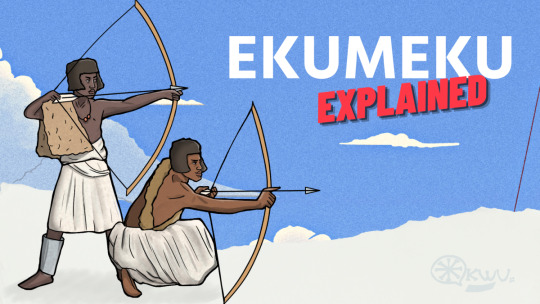
View On WordPress
#30 years ekumeku#a history of delta igbo people#adiele afigbo#akwa ocha#ANIOMA#British native courts#colonialism in nigeria#delta igbo#delta igbo history#EKUMEKU#EKUMEKU WARRIORS#igbo#igbo anime#igbo culture#igbo essays#igbo history#igbo nigerian history#igbo resistance to colonialism#igbo wardfare#Ika Igbo#native courts#nigeria#ogwashi-ukwu#pan igbo#pan-igbo studies
13 notes
·
View notes
Text
Fate Of Failed State
Nigeria a former British colony has been known to be the gaint of Africa, but the reality is that nigeria is a disgrace to Africa. I am going to give a detailed explanation to why Nigeria is a failed state and what will befall anyone who choose to die defending a dead unity in that Nigeria.
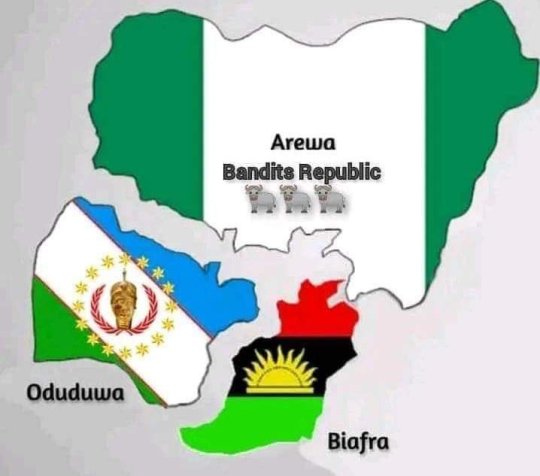
Nigeria and her government is still under the control of colonial powers ,what we had in Nigeria was a flag independence but economically, politically, socially even mentally we are under the direct supervision and control of the imperialist, British, USA and France .
The British and west in general prefer to give aid to Nigerians rather than allow them control their government, elect their idea leaders and control their economy, they keep interfering into our politics because they clearly want to be in control of our vast resources. They continue to use the media to hide the truth , the silent every voice that speak , the stop every leader that will cut of the ties they have in Nigeria or any other African countries.
USA and Canada was a former British colony and they are doing well economically, they control their politics and economy. Why then is Nigeria with vast resources like crude oil, gold , Californium still very poor and backward.
When you (Britain) came to Nigeria in 1861, they came with Bible and a gun , they saw our crude oil and our heritage , they find different set of people with different ideology and cultural differences,but they put us all together and called us Nigerians before then our fathers fought against this white man decision of amalgamation.
the ekumeku warriors from anioma now Biafra land fought the British for 31 years 1883-1914 , but British forced them into Nigeria which is undemocratic, not religious but they did it nobody cares, after all they are Africans , "we are aid to them ''
the British war against arochukwu confederacy a biafran government before the British came , the was started in 1901-1902, the British killed this people because they didn't accepted their rulership in arochukwu a Biafraland but why is BBC News not remembering this kind of stories , why? Is the uk parliament acting so ignorant in the plea for Referendum in Nigeria because they want to control us till eternity
nigerians are not one people.
They people living in that country is racially divided and nothing can heal the grudge they have for each other not even negotiation for peace and unity.
Ethnic hate is very much that a single revolution can't happen in Nigeria because the rate of tribalism will not allow a revolution to eradicate bad rulers , the colonial powers and the imperialist know this and they prefer Nigeria by force than division a choice of the people.
The Biafran people agitating for a Referedum has suffer ethnic cleansing , mass murder and genocide ,in 1967/70 more than 6 million innocent children where killed by the combine force of Nigeria armed forces , Britain, USA , Egyptian pilots , Russians ammunition, the Biafrans has nothing to defend themselves, they fought and resisted this combine forces with home made arms.
They fought Nigeria government and their white ally because they wanted a solution to the harrasment, intimidation, ethnic descrimination, tribal hate , hate actions and killings
Who will not fight for survival?
They continue to kills us till date
During this war BBC News, CNN and others couldn't report this genocide committed by the British and Nigeria government on the innocent biafrans who only crime is to be born around crude oil and natural resources
During this war Food was not allowed entrance into the Biafran territory
It was a media and economic blockade
A genocide.
But today
The children of this heros and legends who fought for survival is asking peacefully for a Referedum date.
They are asking for a day to decide if they want to continue in this Nigeria.
Yet they kill them again
Britain and USA are acting ignorant again
Their media can't cover the Nigerian army kill and harrass Biafrans peaceful protesters
Nobody cares
When this young men who have chosen peace to get their stolen heritage~Biafra look for it in a violent way this media will call them terrorist it will no longer be a revolution as it should be .
Nigeria will fall
Biafra Referedum must hold
White supremacist, the imperialist must leave biafran territory and Africa in general
#quotes#technology#sports#home & lifestyle#food#education#entrepreneur#business#history#politics#Biafra referendum
1 note
·
View note
Text
The New Sea Monster Volunteer Force In Rivers State
The New Sea Monster Volunteer Force In Rivers State
A new unknown gunmen group announces its birthing yesterday in a video that has now gone viral. From a quick lookover, the group is likely based in Rivers State. They announced that their aim is to clear the land of Islamic radicals.
They also acknowledged other known armed groups like the Motherland Warriors, The Ekumeku Warriors, The Niger Delta Volunteer Force etc. And called for the release…

View On WordPress
1 note
·
View note
Text
nigeria giant of Africa
Nigeria is often referred to as the “Giant of Africa”, and with good reason. With a population of about 200 million it is the seventh most populous country in the world. It also has the third largest youth population. These young people are doing it all from starting tech businesses, to making music, to writing books. Of course you know that Africa is not a country, but how much do you know about each of the countries that make up the continent? Nigeria Giant of Africa; is a great place to start with.
Now, if you watch the video above, you won’t need to read the details in the rest of this article. The video also features the Afro-House fusion dance record “Ijo (Dance)” by Wyll Diamond.
Nigeria: Basic Facts
Official name: Federal Republic of Nigeria
Other names: Giant of Africa
Capital: Abuja
Independence date: October 1, 1960
Official languages: Nigerian English
Currency: Naira (₦) (NGN)
Former colonizer:Great Britain
Country population: 201 million (2019 estimate)
Current leadership: President Muhammadu Buhari assumed office May 29, 2015
Major ethnic groups: Hausa, Igbo and Yoruba
Major religions followed: Christianity and Islam
Major cities:
Lagos
Kano
Ibadan
Benin City
Port Harcourt
A Brief History
Colonization dates:
August 1861 – Britain annexed Lagos as a Crown Colony with the Lagos Treaty of Cession
January 1, 1901 – Nigeria became a British protectorate, and part of the British Empire
International Organization Memberships:
African Union (founding member)
United Nations
Commonwealth of Nations
OPEC
Tourism
Nigeria: Giant of Africa is a giant in terms of its rainforests and savannah stretches that it features across its terrain.Where the rest of the world is battling to conserve their natural reserve amidst the pollution and exploitation, Nigeria is still giving its best efforts and the results are not disappointing.It is the 6th out of seventeen most biodiverse regions of the world. These forests are home to a diversified flora and fauna. It ranks as the 10th most diversified flora rich region of the world. Apart from this the country ranks third in the richest marine biodiversity genre.
This country is also a hub of ethnicity. It houses some of the oldest and most ethnic tribal and cultural groups of the world. These groups are known for their nature friendly practices and minimalism inspired livelihood. Despite living in the wild, they are one of the most resistant to diseases. Many explorers have visited these groups to learn about their rituals and culture that promote a healthy lifestyle.
The ethnic Education
To ensure that the new generation adults do not forget their roots, children are given training on their ethnicity and culture. They are taught how to live in harmony with nature. Though the training might seem to be a bit harsh, the child grows up to be fully independent adult who has the requisite skills to earn his own livelihood. They are trained in skills such as weaving, carpentry and much more. Though employment rate is challenged throughout the globe and Nigeria being no exception to it, yet indigenous people manage to fill their tummies pertaining to the initial training they have received.
Economics:
20th largest economy as of 2015, worth more than $500 billion and $1 trillion in terms of nominal GDP and purchasing power parity
Wars and conflicts
Ekumeku War (1883–1914) was a series of uprisings against the rising power of the Royal Niger Company of the British Empire in Anioma, the Igbo subgroup in present day Delta State. Although the Ekumeku failed in 1914, but the western Anioma treasure their memory as imperishable legacy. Heroes included DunkwuIsus of Onicha-Olona, NwabuzoIyogolo of Ogwashi-Ukwu, AwunoUgbo, Obi of Akumazi, AgbambuOshue of Igbuzo, Idabor of Issele-Ukwu, OcheiAghaeze of Onicha-Olona, Abuzu of Idumuje-Unor, IdegwuOtokpoike of Ubulu-Ukwu are still remembered in Anioma land. The Ekumeku War is one of the most vigorous campaign of opposition to the British empire and inspired later rebellions such as the Mau Mau of Kenya.
The Anglo–Aro War (1901–1902) was a conflict between the Aro Confederacy in present-day Eastern Nigeria, and the British Empire. Some of the Aro leaders, like OkoroToti, were arrested, tried by tribunals, and hanged. The Aro Confederacy was destroyed and EzeKanuOkoro (king of Arochukwu), went into hiding but was later arrested.
Aba Women’s Riots of November 1929 – Igbo women protested and accused Warrant Chiefs of restricting the role of women in the government.
Civil war (1967–1970) – “The disequilibrium and perceived corruption of the electoral and political process led, in 1966, to back-to-back military coups. In May 1967, the Southern Region declared independence as a state called the Republic of Biafra, under the leadership of Lt. Colonel EmekaOjukwu.[64] The Nigerian Civil War began as the official Nigerian government side attacked Biafra on 6 July 1967 at Garkem. The 30-month war, with a long siege of Biafra and its isolation from trade and supplies, ended in January 1970.[65] Estimates of the number of dead in the former Eastern Region are between 1 and 3 million people, from warfare, disease, and starvation, during the 30-month civil war.”
Some Trivia
Most populous country in Africa (as of 2019)
Seventh most populous country in the world (as of 2019)
Third-largest youth population in the world, after India and China, with more than 90 million of its population under age 18
Over 250 ethnic groups
Nigeria is the 12th largest producer of petroleum in the world and the 8th largest exporter, and has the 10th largest proven reserves. (The country joined OPEC in 1971.) Petroleum plays a large role in the Nigerian economy, accounting for 40% of GDP and 80% of Government earnings.
Prebendalism refers to political systems where elected officials and government workers feel they have a right to a share of government revenues, and use them to benefit their supporters, co-religionists and members of their ethnic group.
6 notes
·
View notes
Photo

THIS WE WEREN'T TAUGHT IN SCHOOLS IN ORDER TO MAKE US FEEL WEAK THROUGH OUR ANCESTORS. The resolutions of the Berlin conference of 1884-1885, gave European nations the rights to lay claim to lands and resources in Africa. Britain, who had engaged in the trade with coastal cities before and during the 19th century, made bold their intentions to covet resources and rule over indigenous nations all over Africa. They came with guns and preachers. Many Africans tribes resisted the British invaders, and this led to protracted wars. Many African tribes put up a great fight against the superior fire power of the suppressive British. One of such tribes are the Igbo people of ancient Biafra, who are now one of the three major tribes in Nigeria. The Ekuemeku Movement was the name of Igbo army, that held the British at bay and fought them for 31 years. The Ekumeku movement consisted of a great number of attacks and uprising by the Anioma people of land, against the British, from 1893-1914. The Ekumeku warriors were bound by a secrete oath, and meticulously utilized guerrilla tactics to attack the British Royal company, who were determined to penetrate Igbo land. The Ekumeku warriors were drawn from thousands of Anioma youth from all parts of Anioma land. As the war rages on, the Ekumeku warriors defended their rights tom live peacefully without foreign interjection, while the British used heavy armaments. They destroyed homes, farms, and roads, by bombardment. The British invaded Ndoni in 1870 and bombarded Onicha-Ado (Onicha) on November 2nd, 1897, from River Niger. This set the tempo for the rest of the war. The Royal Niger Company was commanded by Major Festing. They engaged the Anioma people of Ibusa in 1898. The battle was so severe in 0wa/Okwunzu, in 1094, that the commander W.E.B Crawford requested for more arms from the British headquarters to crush the Western Anioma communities. The people of Owa again in 1906 engaged the British in a gruesome battle that consumed the life of the British commander S. O. Crewe ......... Continuing https://www.instagram.com/p/B0tmMnzgYEe/?igshid=1540ukotanf12
1 note
·
View note
Text
SO BAD:Why British Will Never Trust Igbo People---Nnamdi Kanu Reveal
New Post has been published on https://thebiafrastar.com/so-badwhy-british-will-never-trust-igbo-people-nnamdi-kanu-reveal/
SO BAD:Why British Will Never Trust Igbo People---Nnamdi Kanu Reveal


(adsbygoogle = window.adsbygoogle || []).push();
Kanu speaking Radio Biafra broadcast Friday said that that Biafra restoration project is insurmountable
Kanu said “We must neither mutate nor mortgage our blissful future and that of the upcoming Biafran generation, no matter the attraction of temporal comfort.
(adsbygoogle = window.adsbygoogle || []).push();
We have come this far, staking our lives and all for this all important project. The evolving developments in Nigeria are clear indications that we are close to the finishing line.
Loading…
“Our quest for freedom started not just in the 60s nor 40s but in late 20s and before that in the first decade of the 20th century.
(adsbygoogle = window.adsbygoogle || []).push();
After Arochukwu fell to the British in 1904, seven sons from Aro left for Anioma to form the feared and much revered Ekumeku fraternity to continue a guerilla war against the British.
“Come Thursday 30th May 2019, Biafrans both at home and in the diaspora will yet defy every odd to accord our heroes and heroines both living and dead, well-deserved honour and recognition for their priceless sacrifice in the Biafra restoration struggle.
(adsbygoogle = window.adsbygoogle || []).push();
This memorial will be accompanied by a total Sit-At-Home observance across Biafraland. The slain chose to fall that we may live and nothing less will suffice.
“This is the reason why the British will never trust us. Compare that the British take-over of the north where they were welcomed and worshipped till date. Ironically we that fought the British in actual war ended up as Christians whereas Fulani controlled north that were subservient to the British retained and even expanded their Islamic identity.
(adsbygoogle = window.adsbygoogle || []).push();
“We are born with freedom in our DNA. We did not wake up one morning to hate Nigeria, they have always hated us. In November 1929 the British killed our mothers in Aba that dared to question their rule and punitive taxation.
“This year is the 100th anniversary of their death and those that claim they are intellectuals in Igboland have all carefully forgotten because they don’t want to offend their Fulani masters.
It has fallen on IPOB again to remind the world what the heroics of our mothers mean to us today. In November this year, we shall honour them.
(adsbygoogle = window.adsbygoogle || []).push();
“Have we forgotten that our dear British that gave us Anglican Church shot dead 21 striking miners in Enugu on November 1949. One bystander was killed and 51 people injured. Nobody remembers them and that is why Fulani are still killing us today.
“The coordinated resistance against the combined military invasion of Nigeria and her foreign mercenaries led by the British, lasted for a period of three good years (1967-1970), to the disappointment of the invaders, claiming not less than 3.5 million Biafrans including men, women, children and even the elderly. Biafran economy, properties/possessions, worth fortunes, were totally plundered by Chief Obafemi Awolowo. These are irrefutable historical facts.
(adsbygoogle = window.adsbygoogle || []).push();
“Our people are steadily being marginalized, victimized, kidnapped, gruesomely murdered, pauperised and enslaved across the Nigerian contraption.
Incidents that prompted the Biafran armed resistance in defense of their people and homeland (territories) dating back between 1945 and 1970 are very much prevalent after over forty years of hypocritical unity/federalism.
(adsbygoogle = window.adsbygoogle || []).push();
Biafrans have over the years, variously sacrificed for the unfettered restoration of the sovereignty of their fatherland. I, alongside many others, within the IPOB global family have made and are yet making invaluable sacrifices despite life-threatening persecutions from the enemies.
“Many of us have been extra-judicially arrested, imprisoned/detained and murdered in this struggle by the agents of the Nigerian state. Fulanis political merchants (saboteurs, traitors, and propagandists) both within and without, have persistently vilified me and the struggle in virtually all fronts, with abysmal failures hitting their every move.
(adsbygoogle = window.adsbygoogle || []).push();
All their evil strategies and enterprises will continue to suffer shame and disappointment because in the end we always win.
“The much anticipated Biafra independence is quite imminent. The date and time heralding its declaration may not be known or determined but behold, it is in the horizon.
(adsbygoogle = window.adsbygoogle || []).push();
Biafra will be free and we must all get our eyes fixed on the ball for the appointed season of our glory”
0 notes
Text
Ụ́kpụ́rụ́: BHM Guide
BHM Topics Centring on Igbo History and Culture.
Lejja: 4000 Year Old Iron Smelting Site
Tag: #metallurgy | #metalwork
Archaeological investigations at the prehistoric iron smelting site of Lejja, Nigeria, made possible the study of some large scale iron smelting debris – evidence of a once thriving iron smelting community. The main village square in Lejja, contains over 800 slag blocks weighing between 34 and 57 kg. Furnaces, tuyères and slag are visible on the surface in many places. The site has been radiocarbon dated to approximately 2000 BC. [more+]
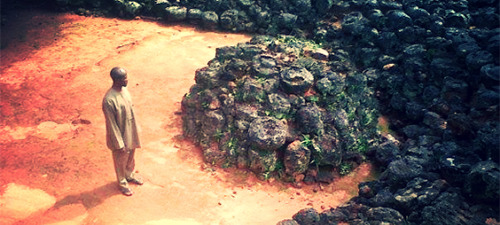
Lejja village square [+]
Igbo Ukwu
Tag: #igbo ukwu
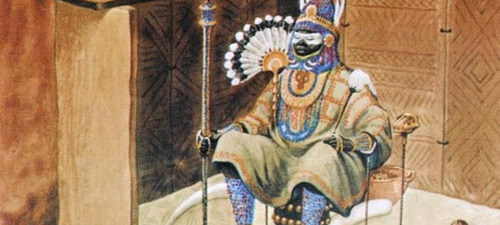
9th century nobleman’s tomb [+]
It is possible that the inhabitants of Igbo-Ukwu had a metalworking art that flourished as early as the ninth century (though this date remains controversial). Three sites have been excavated, revealing hundreds of ritual vessels and regalia castings of bronze or leaded bronze that are among the most inventive and technically accomplished bronzes ever made.
— Met Museum [more+]
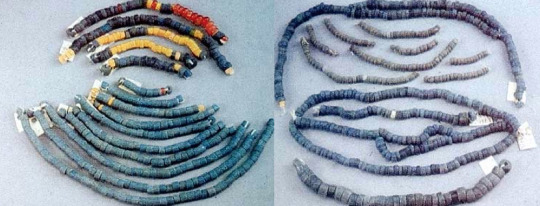
More than 165,000 beads of Indian, (medieval) Egyptian, and Venetian/Mediterranean origin points to trans-Saharan trade reaching the Lower Niger in the 9th century. [+]

The coast is 100 miles away from Igbo Ukwu, the presence of a bronze in the shape of a triton shell suggests a sea trade in the Niger Delta area was significant in the 9th century. [+]
>> Some of the oldest fibres of textiles found in western Africa [+]
>> Eri and Nri, Founders of Nri c. 10th century, associated with Igbo Ukwu
Nsibidi: Pre-15th century Ideographic Writing
Tag: #nsibidi
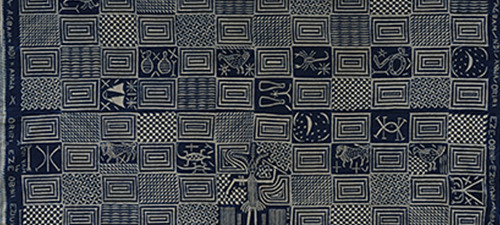
Ukara Nsibidi cloth [+]
Nsibidi is an ancient system of graphic communication indigenous to the Ejagham peoples of southeastern Nigeria and southwestern Cameroon in the Cross River region. It is also used by neighboring Ibibio, Efik and Igbo peoples. Aesthetically compelling and encoded, nsibidi does not correspond to any one spoken language. It is an ideographic script whose symbols refer to abstract concepts, actions or things and whose use facilitates communication among peoples speaking different languages.
— Smithsonian [more+]
>> Jean-Michel Basquiat and Nsibidi [+]
Old Calabar, Bonny and the Slave Trade
Tag: #slavery
The slave trade in the area known as Bight of Biafra (today eastern Nigeria and southern Cameroon) was very significant, millions of people were taken captive in this area and taken to the Americas by Europeans.
The Trade
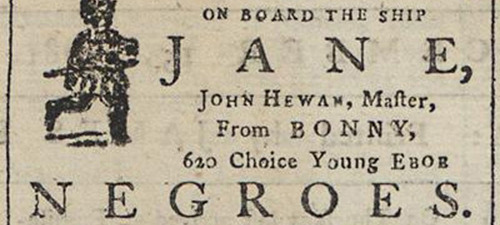
620 enslaved Igbo from Bonny to Montego Bay, Jamaica [+]
>> Port of Bonny
>> Igbo Names on the Amelié, 19th Century Slave Ship, Martinique
>> European Items Traded with Africans in exchange for Captives
>> The Interesting Narrative of the Life of Olaudah Equiano
>> Nancy Daniels survived the Atlantic Crossing
Resistance
>> African Resistance from the Shore and Slave Ship Captures by Africans
>> Ibo Landing, Geogria – Tag: Ibo Landing
>> Bussa’s Rebellion, Barbados – [+] | [+]
>> Igbo Runways in Virginia
>> Monday Gell and the Denmark Vesey Case – [+] | [+]
>> Eboe Rebellion, Jamaica
The Trans-Atlantic Link
Tag: #The Invisible Atlantic Cord
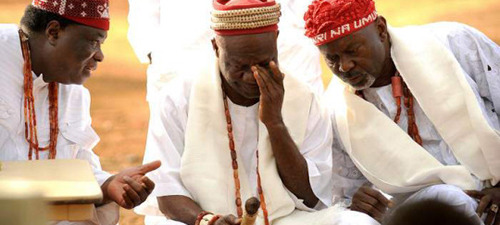
Eze Nri memorial of the enslaved, Virginia [+]
>> West Indian Igbo Words >> Igbo-West Indian Folk Idioms
>> Afro-Virginian Art and the Bight of Biafra >> Awka Metallurgy in America
>> US descendants >> Diaspora Igbo
>> Jaja of Opobo in Barbados
>> Ibo Granmoun: The Roots of Haitian Democracy >> The Igbo in Haiti
>> Eze A. Ogueri II: An African in British Guiana
Colonial Resistance
>> The Story of King Jaja of Opobo (1821-1891)
vimeo
>> The Ekumeku Movement – Tag: #ekumeku
>> Anglo-Aro War – Tag: #anglo-aro war

Re-enactment of the women’s protest, 60th Anniversary of the Women’s War of 1929 [+]
>> Women’s War of 1929
>> Iva Valley Massacre at Enugu – [+] | [+]
Other
| >> Indigenous Technology and Colonialisms Effects
| >> Impact of Indigenous Beliefs about Sacred Animals in the Niger Delta and Cross River area on Wildlife protection
| Folk tales: Asele, The Legendary Designer | Okpangu, The Ape Man | Goddess Idemili | Nza The Smart
| Other tags: #bio | #books | #art | #architecture | #women | #spirituality | #biafra
188 notes
·
View notes
Text
0 notes
Text
The Ekumeku Movement, The Fiercest Warriors That Fought The British For 31Years
The Ekumeku Movement, The Fiercest Warriors That Fought The British For 31Years
(more…)
View On WordPress
0 notes
Text
Who Are the Anioma?
Who Are the Anioma?
A brief look at the Anioma (Western Igbo/Delta Igbo)
WHO ARE THE ANIOMA?
The Anioma are a diverse group of Igbo speaking communities indigenous to the northern half of Delta State. The name “Anioma” is an acronym derived from the regions that make up the area: Aniocha (A), Ndokwa (N), Ika (I) and Oshimili (O). The last suffix “MA” gives it meaning in the Igbo language, in Igbo ‘ani oma’ means…

View On WordPress
#AKWA OCHA ANIOMA#ANIOMA#ANIOMA FACT FILE#ANIOMA HISTORY#EKUMEKU#FAMOUS ANIOMA PEOPLE#igbo fact file#IKA LANGUAGEUKWUANI LANGUAGE#NDOKWA#NIGERIAN HHISTORY#OMENALA IGBO#OSHIMILI#WESTERN IGBOLAND#WHO ARE THE ANIOMA
2 notes
·
View notes
Photo

Western Ibo Society and Its Resistance to British Rule: The Ekumeku Movement 1898-1911
Western Igboland opposed the encroachment of British rule from the 1880s till its imposition in the turn of the 20th century by staging various protests and guerrilla warfares centred on the town of Asaba, collectively known as the Ekumeku Movement. The movement in all spanned from the 1880s till the 1910s alongside other anti-British movements in Igboland (equally met with armed force by the British) in addition to preceding other oppositions to the British finally (officially) ending with the independence of Nigeria in 1960. You can read Philip Igbafe’s paper on the movement written in 1971 with a free account on JSTOR and adding it to the accounts shelf: http://www.jstor.org/stable/181043
49 notes
·
View notes
Text
Western Igbo Society and Its Resistance to British Rule: The Ekumeku Movement 1898-1911

Composite sword with wooden brass-covered hilt & iron blade, in wooden leather-covered sheath with crocodile skin chape & plaited fibre band at mouth. From Ogwashi Ukwu, 1910.
Abstract: When the Royal Niger Company attempted to establish its authority in the Asaba hinterland in the 1880s, the existing town societies in the area provided the foundations of a resistance movement which became known as the Ekumeku. In 1900 the area came under the direct administration of the British government. British rule led to regulations against aspects of the people's religious and political practices and to the establishment of native courts, and provided a shelter under which missionary activities flourished. All these were considered by the people as inimical to their traditional way of life. This situation provoked a consolidation of the Ekumeku forces and galvanized the movement into action. Between 1902 and 1910 the Ekumeku offered a courageous and prolonged resistance to British rule in the Asaba hinterland. In spite of this enduring consistency in opposing the establishment of European rule, the Ekumeku movement was not investigated along relevant lines primarily because it was much misunderstood in official circles, which took its external manifestations for its essence. This paper attempts, from oral and written sources, a study of the actual nature of the Ekumeku as a resistance movement, its organization, its responses to the challenges posed by European encroachment on the Asaba hinterland and its sources of strength which gave it its resilience. In addition to administrative measures, legal enactments, special town laws and prosecution in the native courts, it is shown that the colonial administration relied heavily on the use of armed force to destroy the movement.
—Philip A. Igbafe. Western Ibo Society and Its Resistance to British Rule: The Ekumeku Movement 1898-1911. The Journal of African History. Vol. 12, No. 3 (1971), pp. 441-459
63 notes
·
View notes